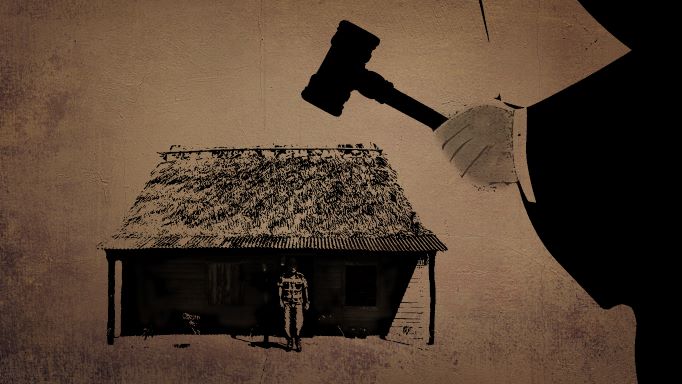Ten days after Miguel Díaz-Canel's seventh visit to the province of Pinar del Río to convey the government's concern for the victims of Hurricane Ian, his government threatened to evict one of the storm's victims: a pregnant women who had no choice but to take refuge in an abandoned property after losing her home.
The phenomenon of "squatter mothers," most frequent in Havana, could spread to Pinar del Río, where 108,501 homes were damaged and only 4,738 have been rendered habitable, including 17 total collapses, according to the Secretary of the Communist Party of Cuba (PCC) in that province, Yamilé Ramos Cordero.
The new Penal Code continues to criminalize Cuban families, mostly single women with minor children, who see no alternative but to reside in state properties to place a roof over their heads.
The General Housing Act declares it illegal to occupy a dwelling without having residential ties with the owner, or to occupy State premises, so perpetrators are immediately removed by the Municipal Housing Directorate with the help of the National Revolutionary Police. Since 1 January, 1985 the State has had no obligation to relocate those evicted.
Cuba's housing deficit of 862,879 units, recognized by the Government, and its continuing failure to deliver on its National Housing Program, which includes a plan to provide housing for mothers with three or more children, force more and more women to occupy State premises.
In many cases, when these women refuse to leave the premises occupied, the authorities desist. Many, however, are not so lucky, as evidenced by the frequent reports on social media of mothers evicted with their children.
Criminal law is supposed to be used by the authorities when there is no other solution to an infraction in other jurisdictions, such that the prosecution of these crimes occurs under special circumstances. Denia Herrera is one of the people who has served time on the island for squatting on state property; in her case, with her daughter, for three years, she told DIARIO DE CUBA.
The new Criminal Code, which retained the offences of the "arbitrary exercise of rights," "usurpation" and "unlawful entry," expanded the Prosecutor's authority to decide when the offence was applicable in cases involving the illegal occupation of privately owned property. Under the previous Code, it was only applicable when the property occupied was state-owned.
For one who engages in the arbitrary exercise of rights, such as that to housing, which the Constitution recognizes, Article 202.1 of the Cuban Criminal Code, which will enter into force on December 1, establishes that "whoever, instead of resorting to the competent authority to exercise a right belonging to him, or that he reasonably infers as belonging to him, whether he exercises it by himself, using violence, or the intimidation of people, or force, to carry out the act, and provided that the results of this do not constitute a greater crime, is subject to a penalty of six months to one year of incarceration, a fine of one hundred to three hundred Cuban pesos, or both."
This criminal offence could be applied to those who forcibly enter buildings belonging to the State and are generally unoccupied, or the dwellings of people that are abandoned after their owners leave the country. If the person occupies a private dwelling and the owner, considered the injured party, "expressly withdraws his complaint before the trial, the case is dismissed," as provided for in Point 2 of the aforementioned article.
However, the withdrawal of the complaint does not trigger those effects when "the social or State interest is affected," as per Point 3 (b).
With regard to the offence of usurpation, Article 421.1 states that "anyone who illegally occupies or seizes property belonging to another person shall be subject to a penalty of six months to two years of incarceration, a fine of two hundred to five hundred Cuban pesos, or both."
According to Point 2, the crime is punishable by imprisonment for two to five years, or a fine of five hundred thousand Cuban pesos, or both, "if force is used (...)".
Point 4 states that "when the sentence involves civil liability, and the obligation of the convicted party or a third party to return the property, the court shall act directly and take the necessary measures to have it vacated and handed over to the corresponding natural or legal person."
Faced with its own inability to solve the housing problem in Cuba for six decades, the Government, then, opts to criminalize those who lack a roof over their heads, so they a seek a solution on their own. Their options are to sleep on the street, have their home collapse on them, or go to jail. One must choose and, above all, understand that the regime has other priorities, about which there can be no doubt at this point
Continuing to build hotels (even if it does not manage to fill them), while failing to implement its own National Housing Program, the regime plans to build new tourist facilities, all while Cubans who lost their homes due to the hurricane lengthen the list of those who have been waiting for a housing solution for decades. Amidst all this, the regime has approved and will soon put into effect a Criminal Code that continues to criminalize those who have no place to live, so they occupy empty premises, while the new Housing Law, originally slated on the legislative schedule for December 2020, continues to be put off.
The regime's priorities also tell us that Cubans should expect very little from the new Housing Law when it is finally passed.
